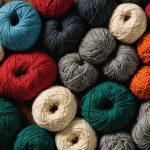Understanding Eco-Conscious Materials
When selecting eco-friendly winter coats, eco-friendly materials play a crucial role. Understanding the different sustainable fabrics available can help make informed decisions. Common eco-friendly materials include organic cotton, hemp, bamboo, and recycled polyester. These materials are chosen for their lower environmental impact, offering a more responsible alternative to conventional fabrics.
Sustainable fabrics offer numerous benefits over traditional options. They usually require fewer chemical inputs, less water, and are often biodegradable, reducing pollution and conserving resources. For instance, organic cotton is grown without harmful pesticides, while recycled polyester reduces the need for virgin materials and energy. This makes sustainable fabrics a preferable choice for those seeking to minimise their environmental impact.
Additional reading : Elevate Your High Street Fashion to Shine at UK Music Festivals
The choice of material significantly influences environmental sustainability. Fabrics sourced sustainably contribute to lowering the carbon footprint of product manufacturing. Additionally, choosing materials with a lower environmental toll supports ethical production practices, such as fair labour conditions and reduced waste. As consumers become more aware of their purchasing power, opting for clothing made from eco-friendly materials not only supports eco-conscious brands but also inspires industry-wide change towards sustainable fabrics. By prioritising these attributes, one can make a tangible difference in preserving the planet.
Top Brands Committed to Sustainability
When exploring eco-friendly fashion, several brands stand out for their commitment to sustainable practices. These eco-conscious brands not only produce environmentally friendly winter coats, but also champion ethical production values, ensuring that their sustainable fashion offerings align with principles of social responsibility.
Also to discover : Ultimate guide to caring for your wool garments: expert tips and techniques for lasting quality
Leading Eco-Friendly Brands
- Patagonia: Renowned for its environmental activism, Patagonia integrates recycled materials across its product lines, promoting circularity.
- Vaute Couture: This brand’s dedication to vegan materials makes them a frontrunner in cruelty-free fashion, offering stylish yet sustainable fabrics.
- ECOALF: Having recently launched initiatives to clean oceans by transforming waste into wearable items, their mission reflects a profound commitment to ecological stewardship.
Ethical Production Practices
Ethical production is crucial to maintaining credibility in sustainable fashion. Brands like People Tree emphasise fair trade principles, ensuring that workers receive fair compensation and work in safe conditions. This dedication goes beyond surface-level commitments, contributing positively to the environmental impact and societal progress.
Brand Comparisons
In comparing brand sustainability commitments, it’s essential to assess the transparency of their supply chains, the tangibility of their eco-promises, and their proactive involvement in reducing the fashion industry’s climate footprint. Making informed choices ensures support for genuine eco-conscious brands driving change.
Selection Criteria for Eco-Friendly Winter Coats
Choosing an eco-conscious winter coat involves understanding various sustainable criteria to ensure you’re making a positive environmental choice. First, consider the insulation types. Materials such as recycled polyester and natural down alternatives offer excellent warmth without harming the environment. They are pivotal in evaluating a coat’s environmental impact.
When selecting a coat, balance style and functionality with sustainability. Look for features like adjustable hoods, waterproofing, and breathability, which ensure practicality without compromising on ethical production. Remember, a coat should last several seasons, so durability is crucial.
Another critical factor in your buying guide is evaluating the sustainability of materials. Fabrics made from organic cotton or recycled polyester are excellent choices for their reduced ecological footprint. Check if the coat’s materials are certified by reputable organisations that verify sustainability claims, as this contributes to true sustainable fashion.
Lastly, community reviews and expert recommendations can guide you in finding coats that align with your values. Speak to others who have purchased eco-friendly winter coats and read reviews for insights into comfort, sizing, and everyday wearability. Armed with this information, you can make informed, eco-conscious choices when investing in a winter coat.
Product Recommendations for Eco-Conscious Winter Coats
Selecting an eco-conscious winter coat involves exploring options that align with both sustainability and style. Here we present a curated list of standout recommended products to help you make environmentally informed choices.
-
Patagonia Tres 3-in-1 Parka: Combining versatility with sustainability, this coat features a recycled polyester shell, offering excellent insulation while minimising its environmental impact.
-
Vaute Couture Ella Coat: Known for its fashion-forward design, the Ella Coat uses sustainable fabrics like vegan wool, providing warmth and style for those valuing cruelty-free alternatives.
-
ECOALF Brescia Puffer Jacket: Constructed from upcycled waste, this jacket underscores its commitment to circularity, ensuring your winter coat selection supports ocean clean-up initiatives.
Beyond the eco-credentials, assess how each eco-conscious option balances design with functionality. Although prices can vary, the longevity and quality of these recommended products often provide excellent value for money. Look for unique features like waterproofing or adjustable fittings to ensure the coat suits your lifestyle needs while maintaining sustainable criteria standards. Leverage consumer insights and experiences to confirm your choice aligns with your ecological values and practical requirements.
Verifying Sustainability Claims
Navigating the world of sustainable fashion can be tricky, especially with the rise of greenwashing. To ensure your winter coat choices are genuinely eco-conscious, look for reputable sustainability certifications such as GOTS and Fair Trade. These labels guarantee that products meet strict environmental and ethical standards, providing assurance of their eco-friendly credentials.
Understanding brand transparency is key. Ethical companies openly share supply chain details and sustainability goals, demonstrating a genuine commitment to reducing their environmental impact. This transparency helps consumers make informed decisions and support brands that prioritise ethical production practices.
Beware of greenwashing tactics, where brands deceptively market products as more environmentally friendly than they are. Indicators include vague claims like “natural” or “eco-friendly” without any certification or supporting information. To avoid falling for greenwashing, research brands thoroughly. Look for detailed descriptions, third-party verifications, and consumer awareness resources.
As consumers, your vigilance in verifying claims not only ensures the authenticity of sustainable products but also encourages broader industry change. By demanding transparency and authenticity, you help drive the fashion industry towards more sustainable and responsible practices. This collective advocacy plays a vital role in advancing sustainability initiatives and promoting genuine eco-friendly choices.
Care Tips for Longevity of Eco-Friendly Coats
Understanding proper coat maintenance is essential to extend the life of your eco-friendly winter attire. By following these simple care instructions, you can ensure your wardrobe remains sustainable and aligned with your environmental values.
Begin with sustainable washing practices; use cold water and eco-friendly detergents. This not only preserves the fabric’s fibres but also reduces energy use. When it comes to drying, air dry your coat whenever possible. Machine drying can weaken the material over time, decreasing the coat’s lifespan.
Repairs are a critical aspect of sustainable practices. Mending small tears or replacing buttons can significantly prolong your coat’s life. Consider using patches from sustainable fabrics to maintain eco-friendly integrity.
Finally, embrace the concept of reuse. Donating or upcycling your coat when it’s outgrown or no longer needed reduces waste. Sharing climate-conscious fashion positively impacts the environment.
These care tips are not just about preserving clothing; they emphasise a holistic approach to sustainable fashion. Minimal environmental impact is crucial, and by maintaining your winter coat effectively, you participate actively in eco-conscious living.
Care Tips for Longevity of Eco-Friendly Coats
Ensuring the longevity of your eco-friendly winter coat aligns with sustainable practices and reduces waste. Proper care starts with understanding the specific care instructions for each material, which often include sustainable washing practices. Using cold water and eco-friendly detergents not only preserves the coat’s integrity but also diminishes its environmental impact.
To minimise environmental damage, air drying is preferable over machine drying. This practice saves energy and maintains the coat’s structure, avoiding potential shrinkage and wear. Regularly inspect your coat for repairs, as quick fixes can prolong its life. Small repairs prevent minor issues from becoming significant, costly problems.
Incorporating repair as part of your routine signals commitment to sustainable fashion. Techniques like patching and sewing are valuable skills, promoting reuse over discarding. Repurposing worn-out materials into new creations also reflects sustainable practices, supporting the circular economy.
Finally, store your coat in a cool, dry place during the off-season. This prevents material degradation and keeps it in top condition for years, ensuring your eco-friendly choice remains a worthy investment. By following these methods, you contribute actively to the fashion industry’s shift towards durability and sustainability.
Understanding Climate Impact and Responsiveness
Exploring the climate impact of the fashion industry reveals significant global consequences, particularly in terms of carbon emissions and resource consumption. Sustainability initiatives aim to mitigate these impacts by promoting eco-friendly materials and ethical production practices. Choosing eco-friendly choices like sustainably made coats is a step toward reducing the industry’s footprint.
These initiatives often involve using sustainable fabrics such as organic cotton and recycled polyester, which require less energy and water to produce. Moreover, by prioritising ethical practices, companies minimise their environmental impact, contributing to a healthier planet. As consumers, each purchase you make can contribute positively to this shift.
Your role as a consumer is vital. Advocating for sustainability initiatives by supporting brands committed to transparency and ethical production amplifies the call for broader industry change. These choices not only help reduce the environmental footprint but also encourage a market shift towards genuinely eco-friendly choices.
Engagement in consumer advocacy supports sustainable practices by driving demand for and awareness of environmentally responsible products. This consumer pressure encourages companies to adopt more sustainable practices, ensuring that the fashion industry evolves toward a more responsible and sustainable future.











